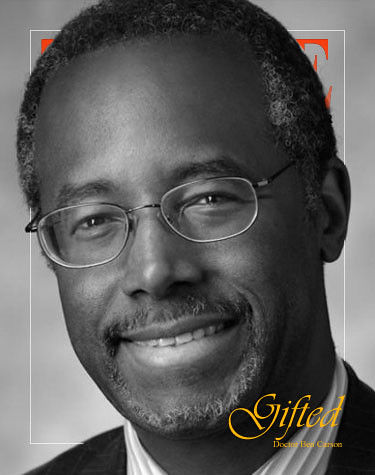
Volume X, Issue X
Benjamin S. Carson MD
There is no such thing as an average human being. If you have a normal brain, you are superior." -- Dr. Benjamin Carson
Many of us first learned about Dr. Benjamin S. Carson when he addressed the National Prayer Breakfast. He was straightforward then with his prescription for America and presented it unflinchingly as President Obama became visibly unsettled by it. Carson's story is an amazing one. His illiterate Mother pressed him to read as a child. She put a check mark on his book reports, so that he would think she had read them. Although he was not a stellar student, he found his passion and became a great Neurosurgeon. He went on to lead his department at Johns Hopkins Hospital, one of the Nation's premier medical centers.
His story is told in the book: Gifted Hands, and although his calm demeanor has many dismissing him as a Presidential candidate, he recently reminded us of the stuff he is made of. The loaded question was this: "Should a Muslim be elected President?" Carson stated the viewpoint that one who embraced Shariah Law could not pledge to: "Uphold and Defend the Constitution." The media was all over it, pretty much trying to force Carson to recant his position... but Carson wouldn't budge. He clarified the issue and stuck to his guns. In doing so, he proved that he has the fortitude and the knowledge necessary for the job.
Here is an Interview [click to read] with Dr. Carson which should serve as an inspiration to many young people. That it is not more heralded has me asking the media: "What's wrong with you?" In this special double issue of THYME we will examine a possible reason our culture misses the greatness of men like Ben Carson.
Dr. Carson addresses the National Prayer Breakfast.
Elites and Intellectuals
Citizen Journalism with a Better Flavor

Volume X, Issue XI
The Vacuum at the Top
There was a time when the "elite" truly seemed to be better than most people. For example, Leonardo da Vinci was an architect, cartographer, engineer, painter, sculptor, writer and legendary inventor among other things. Socrates was a superb stonecutter, soldier, politician and philosopher. Galileo studied medicine, mathematics, physics and has been referred to as "the father of modern science." For much of human history even the lesser "elites" from noble families had a tremendous advantage over the average man in a time when an education was hard to come by and their wealth and position in society provided them with opportunities to acquire skills that the general populace couldn't." writes John Hawkins. In an article entitled: Elites Are No Longer Elite [click to read], Hawkins explores the reason this is so. Essentially, Hawkins says that there are no more Renaissance men and women, as people tend to become highly proficient in one area of expertise while remaining woefully ignorant of the world outside of their area of expertise. That was not always so.
There was a time when brilliant people like Claudius Crozet and Isambard Kingdom Brunel needed to know a broader range of knowledge in order to do the works they were able to accomplish. They needed to know more than engineering tables. They needed to understand commerce and markets. These men built railroads, but their work ultimately built communities as they provided avenues of commerce and prosperity. Crozet and Brunel seem far closer in stature to da Vinci than their modern counterparts. Hawkins continues: "Today, in a world where there is a nearly infinite supply of news sources, there are far fewer shared activities than there used to be; college educations are commonplace and people can become extraordinarily wealthy based on a terribly narrow skillset." Indeed, my own experience often included such exercises as drawing for architects who couldn't draw and sometimes in the presentation process, creating design for designers who couldn't. Indeed, I was sometimes amazed that by simply stepping back and taking in a larger picture, the resulting contribution to a work would be better than imagined.
The Académie des Beaux-Arts taught through the process of drawing. The advent of computer drafting led to a whole era of designers who's drawings, though they guided the mouse, where essentially drawn by someone else! The art once deemed so essential to design remains as a brief portion of the course, but it is no longer something a designer immerses oneself in every moment. One feels at times, watching the process, as if the designer is connecting lines and templates. The window manufacturer provides the cuts which are pasted into the drawing on screen. To be sure, the computer has opened up new vistas for the exploration of complex forms, but the buildings we live our everyday lives in do not require complex forms. Before the Second World War, in the early Twentieth Century, there existed a beautiful Classicism that made small houses noble. There was a sense of scale and proportion. There was a sense of shadow and texture. I learned much copying the styles of the renderers of those days.
On a far larger scale, Hawkins observes that our leaders often emerge having shown little or no expertise beyond their small sphere. Virginia boasts an 'elite' Senator who's 'expertise' consists of making a fortune by buying cell phone licenses. His good fortune in acquiring wealth is his credential. He does not know what it is like to struggle for years, paying your employee but not yourself to build a business. That might not be such an issue but for his stated derision of those who do: ""you’re going to see a coalition that has just about completely taken over the Republican Party in this state and if they have their way, it’s going to take over state government. It’s made up of the Christian Coalition, it’s made up of the right to lifers, it’s made up of the NRA, it’s made up of the homeschoolers, it’s made up of a whole coalition of people that have all sorts of different views that I think most of us in this room would find threatening to what it means to be an American." -- Mark Warner [1.]
There was a time when Beauty, Truth, Virtue and Nobleness were seen to spring from a Divine origin. The problem with Senator Warner's statement is that he summarily dismisses a whole group of people who embrace that. The Right to Life springs from the concept of IMAGO DEI, that belief that mankind is created in the Image of G-d. The Second Amendment acknowledges the belief that government serves the people and that power remains with the people. The ability to engage in self-defense is simply an expression of that greater principle. Homeschoolers simply acknowledge that the parent is the first one responsible for training up a child. They extend that responsibility in providing instruction in a broader body of knowledge than early language. Here Hawkins swerves into a greater truth. Modern relativism has rendered obsolete the concept that there is an ultimate source of Wisdom and Truth. The Academy, believing this, no longer teaches it.
Until recent times the Divine underpinning was foundational to learning. By its very nature it invited exploration of a broader world. Design had its inspiration in nature. Flawed human nature was continually challenged by a Divine benchmark. Relativism states that "all truths are equally valid," resulting in a diminished sense of the need to pursue absolute truth. Indeed, there is NO need to pursue absolute truth, for it doesn't exist in their thinking. This immediately serves to narrow one's experience. The celebration of 'Diversity' does NOT serve to broaden because it rails against the notion that there is an absolute. One steps up to the human experience like a consumer of a buffet, sampling interesting dishes but learning nothing about the creation of a meal! Indeed, Hawkins notes that one phenomenon inherent in this mindset is that now we have people who are famous simply for being famous. They need not present a resume of accomplishment. Hawkins cites the example of our President, who was elected despite the conspicuous absence of a resume of accomplishment.
As his election was sealed and his inauguration began, news anchors remarked: "We know VERY LITTLE about him!" A colleague of mine lamented the general lack of investigative journalism in our day, remarking that they must not have the resources for it. NO!, all you needed to do was READ HIS BOOK and you would come away with a strong sense of his Anticolonialist Socialist sentiments. But such is the Modern Age, that we can style the blank canvas of a Presidential candidate to be whatever we want him to be. Because many in our day are unfamiliar with true accomplishment, we fail to look for it!
That is why this publication has recently presented a series of stories of great accomplishment. Neil Armstrong and President Kennedy show us something of it. They showed us how to lift our eyes to the horizon. Kennedy, though a flawed man like most of us, did heroic things in the Pacific War and wrote a book called Profiles in Courage. I read it in Middle School... not as an assignment, mind you, but because it sat on Dad's voluminous bookshelves. Those people assigned to find counterfeit money do not spend a lot of time studying counterfeit money. Instead, they study real money in GREAT DETAIL. By doing so they develop a sense for what the true currency looks like. Even when presented with a very skillful counterfeit they can "feel" it. That is why THYME Magazine has become, if you will, Profiles in Faith! Indeed, there is a real vacuum of true stories of accomplishment that, if we knew them, would inspire us to set our vision higher.
Da Vinci was in fact the illegitimate son of a peasant woman. Nobles in Eighteenth Century England were often useless "idle rich," yet there is a greater nobility that is recurring in the human experience. The First Earl of Mansfield, William Murray, might never have understood fully the depravity of slavery without the presence of his great-niece, Dido Elizabeth Belle in his life! She was an illegitimate child of a slave but because of her father's love, she was accorded the status of a noblewoman. Like Esther of old, she became in a way a representative for the humanity of her people. George Gist was derided by his neighbors, but he created a language for his people. Such is the true nobility that a free society is able to nurture in its people. America has been such an incubator for human brilliance for over two centuries! Those who would cast her aside in the pursuit of their Socialist solutions would do well to reconsider!
The Magician's Twin
C. S. Lewis and the Case Against Scientism
C. S. Lewis explores the modern tendency to elevate science to the status of religion.

Special Book Section
Several weeks ago we began the serial presentation of "Pontifus, The Bridge Builder's Tale in Three Parts." [1.] This week we present the second chapter of the third book: "Little House at the End of the World" Here [click to read]. This special book section will continue through the Summer. The full publication of THYME will resume in the Fall. Look for a new installment of Pontifus each Wednesday morning.